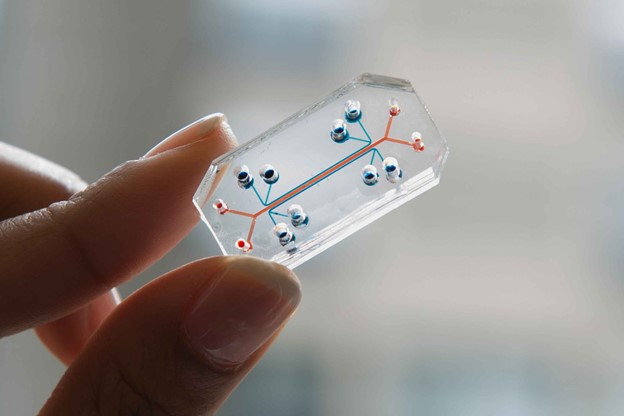You may have seen the recent news about Colossal, a recently-funded Boston startup that’s reengineering the Asian elephant, turning it into a neo-woolly mammoth and reintroducing it to the Arctic, from whence it disappeared 10,000 years ago. Colossal is an offspring of Harvard’s Wyss Institute for Biologically Inspired Engineering. The re-creation of the woolly mammoth may seem fanciful, but it will help save the endangered Asian elephant species and it’s hoped that once the woolly mammoth is back in the Arctic, it will have a positive impact on global warming by allowing for the restoration of grasses that are better reflectors of sunlight than the conifers that replaced them once the woolies disappeared.
Whether the woolly mammoth project turns out to be more fanciful than useful, there’s another Boston-based company spinning out of the Wyss Institute that’s also recently received a hefty investment infusion. And their work is decidedly non-fanciful.
Emulate develops clear plastic chips that can simulate human organs. These are used to test out drugs without having to use animal guinea pigs.
Emulate says that its chips enable researchers to replicate and study human biology and disease with greater precision and detail than is possible with conventional cell cultures or laboratory animals. (Source: Boston Globe)
The organs that Emulate is putting on chips are the brain, colon/intestine, duodenum/intestine, kidney, liver, and lung. The application areas that the chips are used in include cancer, inflammation, infectious disease, and ADME-TOX (checking for Absorption, Distribution, Metabolism, Excretion, and Toxicity).
Emulate’s offering includes instruments and accessories that helps make the organ chips easier to use and yield more reliable data; development kits; and software to help design studies and analyze results. The goal: making drug development faster, better, and cheaper. Here’s hoping they can achieve all three!
Streamlining drug development is greatly needed. According to the Wyss Institute, it can take a decade and over $3 billion to take a drug from lab to approval. And, because animals are an imperfect model of humans, there are times when drugs that are safe for use on animals don’t work so well on humans. Once they get to clinical trials, drugs may prove less effective, or even cause harm. Organs-on-a-chip replicate true human physiology. Deploying them will undoubtedly accelerate drug development.
Here’s how the Wyss Institute describes things:
“Organs-on-Chips” (Organ Chips) [are] microfluidic culture devices that recapitulate the complex structures and functions of living human organs. These microdevices are composed of a clear flexible polymer about the size of a USB memory stick that contains hollow microfluidic channels lined with living human organ cells and human blood vessel cells. These living, three-dimensional cross-sections of human organs provide a window into their inner workings and the effects that drugs can have on them, without involving humans or animals. (Source: Wyss Institute)
This chip doesn’t resemble the chips I’m familiar with, but I find them completely fascinating. And also heartening. So many of us have lost loved ones to devastating diseases. Not to get overly personal, but my mother died of cancer, my father of ALS. Technology that can speed up drug development, and make personalized treatments more possible – as organ chips promise to do – is so urgently needed, and so welcome. I’ve said it before, and I’ll say it again: I’m immensely proud to be part of an industry that does so much good for humankind.
